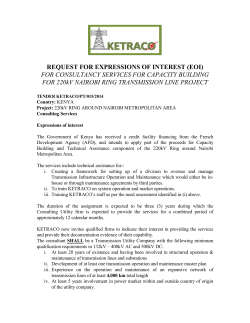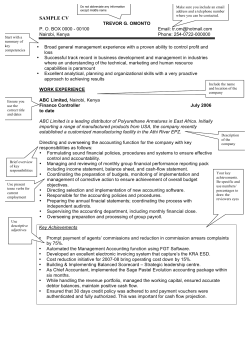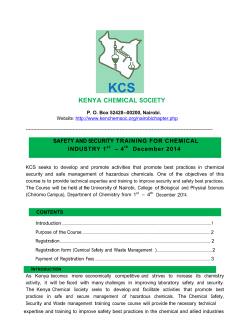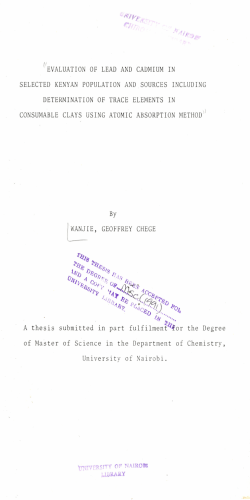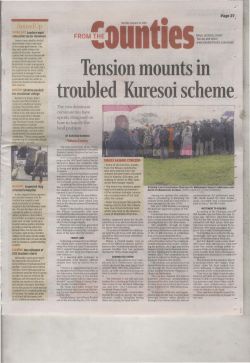
Document 215446
PLEASE RESPECT THE WILDLIFE CODE Respect the privacy of the wildlife, this is their habitat. Beware of the animals, they are wild and can be unpredictable. Don't crowd the animals or make sudden noises or movements. Don't feed the animals, it upsets their diet and leads to human dependence. Keep quiet, noise disturbs the wildlife and may antagonize your fellow visitors. Stay in your vehicle at all times, except at designated picnic or walking areas. Keep below the maximum speed limit (40 kph/25 mph). Never drive off-road, this severely damages the habitat. When viewing wildlife keep to a minimum distance of 20 meters and pull to the side of the road so as to allow others to pass. Leave no litter and never leave fires unattended or discard burning objects. Respect the cultural heritage of Kenya, never take pictures of the local people or their habitat without asking their permission, respect the cultural traditions of Kenya and always dress with decorum. Stay over or leave before dusk, visitors must vacate the Park between 7.00pm - 6.00am unless they are camping overnight. KENYA WILDLIFE SERVICE PARKS AND RESERVES • ABERDARE NATIONAL PARK. AMBOSELI NATIONAL PARK. ARABUKO SOKOKE NATIONAL RESERVE. HOW TO GET THERE Byroad: The Park is 160 kms North-West of Nairobi. From Nairobi take the Al04 road (direction Naivasha). The Main Gate and Park HQ is 4 km south of Nakuru town (from Kenyatta Avenue, take Moi Road the turn left into Stadium Road which leads to the gate). Lanet gate: located along a 1.5 km rough track leading off main A104 road just south of Nakuru's outskirts. It is clearly signposted and offers the most direct accessto both lodges. Nderit gate, in the SEcorner of the Park gives cross-country accessfrom Naivasha or Narok. By air: Via the 1.2 km long 'Naishi" airstrip (in the southern part of the park), Open: . Daily 6:00 am-7:00 pm. Note: No entry is allowed on foot, and visitors will not be allowed into the Park after 6:15pm. Current entry charges: Obtainable via KWS HQ:Tel: (Nairobi) +254(20)6000800,6002345 Fax: +254(20)6007024· Email: [email protected] 'SafarICard'requlred? Entry is by SafariCard only. SafariCard may be obtained and loaded at the main gate. Contact: The Warden: P.O.Box 539, Nakuru Tel: Nakuru +254 (51) 2217151, 2217371 Email: [email protected] • CENTRAL & SOUTHERN ISLAND NATIONAL PARK. CHYULU HILLS NATIONAL PARK • • HELLS CATE NATIONAL PARK. KAKAMECA FOREST NATIONAL RESERVE. KISITE MpUNGUTI MARINE PARK. • K,SUMU IMPALA SANCTUARY. K,UNGA NATIONAL MARINE RESERVE. KORA NATIONAL PARK. • LAKE NAKURU NATIONAL PARK. MAUNDI MARINE NATIONAL PARK. • MARSABIT NATIONAL PARK & RESERVE. MERU NATIONAL PARK. MOMIASA MARINE NATIONAL PARK. • MOMIASA MARINE RESERVE. MOUNT ELGON NATIONAL PARK • • MT. KENYA NATIONAL PARK. MT.lONGONOT NATIONAL PARK. MWEA NATIONAL RESERVE. • NAIROBI NATIONAL PARK. NAIROBI SAFARI WALK & ORPHANAGE. NOERE ISLAND NATIONAL PARK. • OL DONYO SABUK NATIONAL PARK. RUMA NATIONAL PARK. SAIWA SWAMP NATIONAL PARK. • SHIMIA HILLS NATIONAL RESERVE. SIBILOI NATIONAL PARK. TANA RIVER PRIMATE RESERVE. • TSAVO EAST NATIONAL PARK. TSAVO WEST NATIONAL PARK. WATAMU MARINE NATIONAL RESERVE. KENYA WILOU'E saMtE Marketing & Business Development P.O.Box 40241 - 00100 Nairobi Kenya. Tel: +254 (020) 6000800, 6002345 Fax:+254 (020) 6007024 ISDN:+254 (020) 399 2000 Telkom Wireless: +254 (020) 2379407/8/9, 2379410/1/3/4/5/6 Mobile Numbers: +254 (0) 726 610 508/9, 735 663 421, 736 663 400 Email: [email protected] • www.kws.go.ke grayish in colour but white rhino have a wide, flat snout suitable for grazing while black rhino have a concave back and a triangular prehensile lip for browsing on trees and shoots. Where to find them: black rhino prefer bushy forested areas, while white rhino prefer to graze in open grasslands, most especially those of the lake shore. ACTIVITY OPTIONS Catch the best views of the lake For the finest views of the lake visit Baboon Cliff, lion Hill and Out of Africa Hill. The pick of the picnic sites Discover some great picnic sites at Baboon Cliff, Out of Africa Hill and Acacia picnic site (near the Main Gate). Make a circuit of the Park The Park is pleasurable to drive around due to its easy to follow topography, good roads and clear signposting. WHERE TO STAY LODGES 'THE BIRD WATCHERSPARADISE' Lake Nakuru Lodge P.O.Box 561, Nakuru. Tel: (Nairobi) +254(20)212405, 224998 Email: [email protected] Dubbed 'the greatest spectacle on earth' due to the millions of fuchsia-pink flamingo that flock to feed on the teeming algae of its alkaline waters, lake Nakuru is also a ornithologist's paradise, a uniquely rewarding game-viewing venue and a sanctuary for both black and white rhino. Its pink-frosted shores and sky-mirrored waters also yield some of the most evocatively beautiful photo-images in Africa. Sarova Lion Hill Lodge P.OBox 7094, Nakuru. Tel: +254 (51) 850235 or Sarova Hotels (Nairobi) +254(20)2716688,2713333 Email: [email protected] WHAT TO SEE The fabulous flamingo lake Nakuru's lesser flamingo population can reach a pulsating pink mass of over 1.5 million birds. At times, however, they may also relocate to other Rift Valley lakes. Greater flamingo also visit, but in smaller numbers. • SELF-CATERINGACCOMMODATION Naishi House, a scenically placed twin-gabled house, is set amongst acacia trees with magnificent views of the Park. Facilities include a fully equipped kitchen, dining room, sitting room, two bedrooms, (each with a king-size bed and single bed), bathroom, WC, outside terrace and guest cottage with two single bedrooms, a shower and WC (there is a caretaker, and bedding, hot water and kerosene lighting are provided). Private game drives in the company of a KWS Ranger can also be arranged. Reservations through the Warden or KWS HQ, . Nairobi. CAMPING The Park offers two public campsites and seven 'special' or private campsites. The 'special' campsites (no facilities) must be booked in advance on an exclusive use basis (reservations through the Warden or KWS HQ, Nairobi). An ornithologist's paradise with 450 species of birds WHEN TO GO The Park offers an incredible 450 different species of water, fish-eating, terrestrial and migratory birds to include pelican, fish eagle, secretary bird, heron, egret, hammerkop and grebe. lake Nakuru national park is accessible by 2WD vehicles, and also by air, all year-round. Kenya's first rhino sanctuary WHAT TO TAKEWITH YOU Established as Kenya's first rhino sanctuary, the Park now hosts one of the largest black rhino concentrations in the country while substantial numbers of white rhino have also been introduced. How to tell black from white: both are Drinking water, picnic items and camping equipment if you intend to stay overnight. Also useful are: binoculars; camera, hat, sunscreen, sunglasses and guidebooks.
© Copyright 2026
